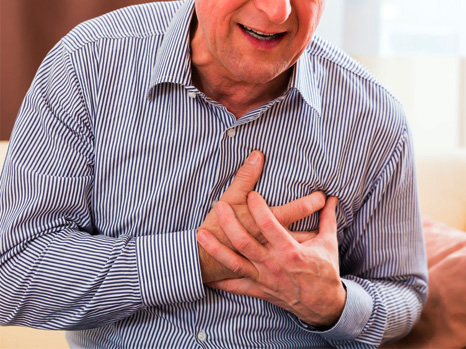Heart attack: signs to look out for
- Posted on 05/12/2022 17:41
- Film
- By raymonddzakpata@sante-education.tg

Extract from the article: A heart attack is an attack on the heart muscle. In the vast majority of cases, it is linked to the presence of a blood clot that obstructs a coronary artery, the vessel that supplies the heart muscles. When blood flow is slowed or blocked, the....
A heart attack is an attack on the heart
muscle. In the vast majority of cases, it is linked to the presence of a blood
clot that obstructs a coronary artery, the vessel that supplies the heart
muscles. When blood flow is slowed or blocked, the heart muscle tissue no
longer receives enough oxygen and becomes necrotic. This tissue damage has a
major impact on heart function and can lead to cardiac arrest. The following are sometimes unrecognised
warning signs that may indicate a heart problem.
When a clot clogs a coronary artery, the heart
is suddenly deprived of oxygen. Very quickly, the oxygen-deprived heart cells
die. It is important to react quickly to avoid complications that can lead to
cardiac arrest.
Tiredness
Tiredness can be a sign of heart disease. When
a person has a cardiac arrest, the volume of blood in the body is reduced,
forcing the heart to work harder. As a result, one becomes exhausted both
during the day and at night. So if you feel exhausted all the time without any
apparent cause, a visit to the doctor is recommended.
Rapid weight gain
Anyone who has gained a lot of weight recently
should consider whether this is due to overeating or an indicator of heart
disease. Fluid accumulation in the body is one of the symptoms of heart
disease. This can result in bloating and flatulence, as well as weight gain.
Irregular heartbeat
Palpitations can be caused by various factors.
They are usually caused by an adrenaline rush or a change in attitude. Anyone
who notices that their heartbeat is becoming increasingly irregular should seek
medical attention immediately. It is essential to address the situation
seriously, as arrhythmia, an irregular heartbeat, can lead to a stroke if left
untreated. If you experience this symptom, seek medical attention.
Sleep disorder
Sleep disorders are usually curable and
harmless. Therefore, it is essential to take insomnia seriously, as it can lead
to heart disease. People who have difficulty falling or staying asleep are
advised to consult a doctor. Difficulty in breathing during sleep may suggest a
build-up of fluid in the lungs. Palpitations are often caused by chest pain.
Shortness of breath
Many people believe that being overweight has something
to do with shortness of breath. It doesn't have to be, though. Even if you
haven't done anything particularly strenuous, shortness of breath can be a sign
of a heart attack. If the airways and cardiovascular system are not working
properly together, it may be a sign of a heart problem that is already
happening or is about to happen. In this case, the lungs are empty of air,
making it difficult to breathe.
Chest pain
One of the warning signs of cardiovascular disease or a heart attack is chest pain. If the pain is accompanied by breathing difficulties, proceed with extreme caution. Go immediately to the emergency room if the pain occurs suddenly and without warning. Aches and pains are distinct. There may be a constricting sensation or burning pain. A heart attack can be diagnosed if symptoms start while resting and last for a few minutes. See a doctor immediately.
Chest discomfort
Several factors can contribute to chest
discomfort. Reflux, for example, after eating fatty foods. However, if the
chest discomfort persists, it may be a sign of a heart attack on the way.
Instead of waiting for the pain to go away on its own, seek medical attention.
It is all too easy to miss the warning signs of a heart attack, and help often
comes too late.
Erectile dysfunction
Heart disease can be one of the causes of
erectile dysfunction. An erection requires extra blood supply. The blood flow
is disrupted when the arteries harden. If a man suffers from erectile
dysfunction, it is essential and prudent to consult a doctor. The doctor will
recommend a specialist if necessary.
Confusion and forgetfulness
There are a variety of reasons for forgetfulness and confusion. Variations in sodium levels can be caused by the presence of specific substances in the blood. This causes confusion as well as memory loss. Malnutrition, exhaustion and a lack of vitamins and minerals can all contribute to the disease. Consult a doctor to avoid and prevent heart disease and its complications.
Panic attacks
Heart attacks and panic attacks can also be confused because of very similar symptoms. Both can be observed through discomfort, shortness of breath, fear, tightness in the chest and sweating. Increased heart rate, dizziness and physical weakness are other indicators of a heart attack and panic. Only a medical diagnosis can help and the problem can be treated, whether it is a panic attack or anything else.
Elom AKAKPO




